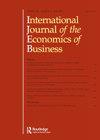Can Intellectual Property Rights Affect Multinational Enterprises’ Entry Modes? The Chilean Case
IF 0.9
Q3 BUSINESS
International Journal of the Economics of Business
Pub Date : 2019-01-02
DOI:10.1080/13571516.2019.1553656
引用次数: 1
Abstract
Abstract Multinational Enterprises (MNEs) can choose between exporting, introducing foreign direct investment (FDI), and licensing to a domestic firm among other modes of entry to a new market. Yet, this decision may be affected by the strength of intellectual property rights (IPR). Thus, this paper analyzes the effect of stronger IPR on the entry modes chosen by MNEs. We propose a theoretical model that predicts that in the presence of stronger IPR, MNEs would choose licensing instead of FDI as an entry mode. We test the predictions of the model using plant-level data for Chile for the period 2001–2007. We exploit the exogenous reform of IPR in 2005, controlling for the activities of industries where high levels of technology transfer and imitation are important factors. The main results show that stronger IPR change the mode of entry chosen by MNEs. In this case, FDI is replaced by licensing. This is explained by Chile’s high absorptive capacity during this period. We test whether this effect differs across high- and low-tech industries and conclude that the displacement of FDI is less severe in high-tech industries.知识产权是否会影响跨国企业的进入方式?智利案例
跨国企业(MNEs)可以在出口、引进外国直接投资(FDI)和向国内公司发放许可证等进入新市场的其他模式之间进行选择。然而,这一决定可能受到知识产权(IPR)实力的影响。因此,本文分析了加强知识产权对跨国公司进入方式选择的影响。我们提出了一个理论模型,该模型预测在知识产权更强的情况下,跨国公司将选择许可而不是直接投资作为进入模式。我们使用智利2001-2007年期间的植物水平数据来检验该模型的预测。我们利用2005年的外生知识产权改革,控制高水平技术转移和模仿是重要因素的行业活动。主要结果表明,知识产权的强化改变了跨国公司的进入方式。在这种情况下,外国直接投资被许可所取代。这可以用智利在这一时期的高吸收能力来解释。我们检验了这种影响在高技术产业和低技术产业之间是否不同,并得出结论,FDI的转移在高技术产业中不那么严重。
本文章由计算机程序翻译,如有差异,请以英文原文为准。
求助全文
约1分钟内获得全文
求助全文
来源期刊
CiteScore
2.60
自引率
8.30%
发文量
9
期刊介绍:
International Journal of the Economics of Business presents original, peer reviewed research in economics that is clearly applicable to business or related public policy problems or issues. The term "business" is used in its widest sense to encompass both public and private sector—governmental, private non-profit and cooperative organizations, as well as profit-seeking enterprises. International Journal of the Economics of Business carries papers relating to three main spheres: The organization—to analyse and aid decision making and the internal organization of the business; The industry—to analyse how businesses interact and evolve within and across industries.

 求助内容:
求助内容: 应助结果提醒方式:
应助结果提醒方式:


